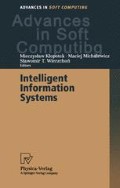Abstract
Machine learning methods are frequently used to create rule-based classifiers. For continuous features linguistic variables used in conditions of the rules are defined by membership functions. These linguistic variables should be optimized at the level of single rules or sets of rules. Assuming the Gaussian uncertainty of input values allows to increase the accuracy of predictions and to estimate probabilities of different classes. Detailed interpretation of relevant rules is possible using (probabilistic) confidence intervals. A real life example of such interpretation is given for personality disorders. The approach to optimization and interpretation described here is applicable to any rule-based system.
Access this chapter
Tax calculation will be finalised at checkout
Purchases are for personal use only
Preview
Unable to display preview. Download preview PDF.
References
Duch, W., Adamczak, R., Grgbczewski, K. (in print) Methodology of extraction, optimization and application of crisp and fuzzy logical rules. IEEE Transactions on Neural Networks.
Duch, W., Adamczak, R., Grabczewski, K. (1999) Methodology of extraction, optimization and application of logical rules. Intelligent Information Systems VIII, Ustron, Poland, 14–18. 06. 1999, pp. 22–31
Duch, W., Adamczak, R., Grabczewski, K. (1998) Extraction of logical rules from backpropagation networks. Neural Processing Letters 7, 1–9
Duch, W., Adamczak, R., Gr4bczewski, K. (1999) Neural optimization of linguistic variables and membership functions. Int. Conference on Neural Information Processing (ICONIP’99), Perth, Australia, Nov. 1999, Vol. II, pp. 616–621
Breiman L. (1998) Bias-Variance, regularization, instability and stabilization. In: C. Bishop (ed.) Neural Networks and Machine Learning. Springer Verlag
Duch, W., Jankowski, N. (1999) New neural transfer functions. Neural Computing Surveys 2, 639–658
Jankowski, N., Kadirkamanathan, V. (1997) Statistical control of RBF-like networks for classification. 7th Int. Conf. on Artificial Neural Networks, Lausanne, Switzerland 1997, pp 385–390, Springer Verlag.
Jankowski, N., (1999) Ontogenic neural networks and their applications to classification of medical data. PhD thesis (in Polish), Department of Computer Methods, Nicholas Copernicus University, Torun, Poland
Duch W., Adamczak R., Grabczewski K. (1999) Neural methods for analysis of psychometric data. Proc. of Enginnering Applications of Neural Networks (Duch W, ed.), Warsaw, Poland, Sept. 1999, pp. 45–50
Duch, W., Kucharski, T., Gomula, J., Adamczak, R., (1999) Metody uczenia maszynowego w analizie danych psychometrycznych. Zastosowanie do wielowymiarowego kwestionariusza osobowoki MMPI–WISKAD. Torun, March 1999; 650 pp, ISBN 83–231–0986–9
Quinlan J.R. (1993) C4. 5: Programs for machine learning. San Mateo, Morgan Kaufman
Duch, W., Diercksen, G.H.F. (1995) Feature Space Mapping as a universal adaptive system, Computer Physics Communication 87, 341–371
Duch, W., Adamczak, R., Jankowski, N. (1997) New developments in the Feature Space Mapping model. 3rd Conf. on Neural Networks, Kule, Poland, Oct. 1997, pp. 65–70
Author information
Authors and Affiliations
Rights and permissions
Copyright information
© 2000 Physica-Verlag Heidelberg
About this paper
Cite this paper
Duch, W., Jankowski, N., Grąbczewski, K., Adamczak, R. (2000). Optimization and Interpretation of Rule-Based Classifiers. In: Intelligent Information Systems. Advances in Soft Computing, vol 4. Physica, Heidelberg. https://doi.org/10.1007/978-3-7908-1846-8_1
Download citation
DOI: https://doi.org/10.1007/978-3-7908-1846-8_1
Publisher Name: Physica, Heidelberg
Print ISBN: 978-3-7908-1309-8
Online ISBN: 978-3-7908-1846-8
eBook Packages: Springer Book Archive

